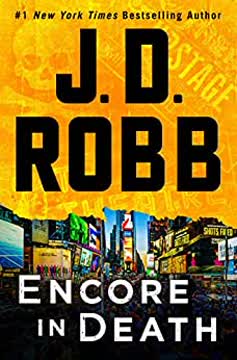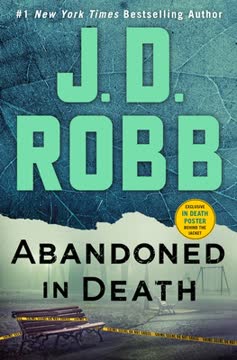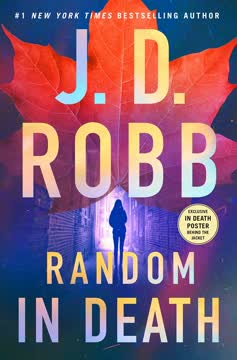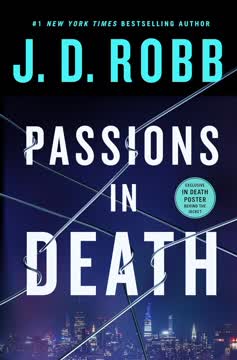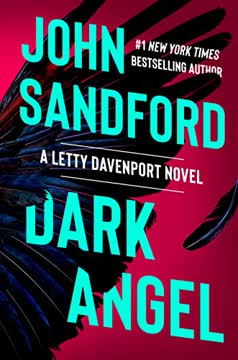Plot Summary
Curtain Rises on Tragedy
Eliza Lane, a legendary Broadway actress, and her husband Brant Fitzhugh, a beloved actor, host a glamorous party in their Manhattan penthouse to celebrate the revival of the musical Upstage. The event is filled with cast, crew, media, and old friends. Eliza, ever the perfectionist, is anxious about the night and her husband's impending six-month absence for a film shoot. The party is a swirl of showbiz egos, rivalries, and old wounds. As Eliza and a young co-star perform a duet, Brant raises a glass to his wife, drinks, and suddenly collapses. The room erupts in chaos as he dies in Eliza's arms, the victim of a swift and violent poisoning.
The Poisoned Toast
Lieutenant Eve Dallas, NYPSD, is called to the scene. Brant's death is quickly determined to be cyanide poisoning, delivered in a champagne cocktail meant for Eliza. The glass was prepared by a bartender, handed to Brant for Eliza, but she passed it back to him before performing. The party's guest list is long, the scene contaminated by media and guests, and the murder weapon—a glass—has already been cleaned up. Eve and her team begin the painstaking process of interviewing guests, staff, and caterers, all of whom had access to the drink. The question looms: was Brant the intended victim, or was Eliza the real target?
Enter Eve Dallas
Eve, with her partner Peabody, launches a high-profile investigation under the glare of the media. The couple's marriage is legendary, seemingly free of scandal or motive. Eve's interviews reveal a web of professional jealousy, old rivalries, and personal secrets. Eliza's rival, Vera Harrow, is openly bitter, but her venom seems more theatrical than murderous. The assistants, staff, and friends all profess loyalty and affection for the couple. The only clear enemy is a former stalker, Ethan Crommell, recently released from psychiatric care. Eve's methodical approach is tested by the celebrity circus and the emotional fallout among the theater community.
Suspects in the Spotlight
Eve and Peabody dig into the backgrounds of the party's attendees. The staff and caterers are cleared, but the plus-ones and old flames are scrutinized. Vera Harrow, the spurned ex-lover, is a prime suspect, but her alibi and attitude don't quite fit. The assistants—Dolby, Cela, Lin—are loyal, but their proximity to the couple and the estate's money raise questions. The investigation uncovers a history of professional competition, especially among those who lost out on roles to Eliza. The possibility of a random party crasher or a deranged fan is considered, but security was tight. The focus shifts to those closest to Eliza and Brant.
The Widow's Performance
Eliza is devastated, but her grief is tinged with a performer's control. She insists Brant had no enemies and their marriage was perfect. Yet, Eve senses layers beneath the surface. Eliza's history is marked by ambition, loss, and a willingness to do whatever it takes to stay on top. The party was her idea, and the drink was her signature. As Eve probes, Eliza's answers are polished, but inconsistencies emerge—especially about her relationship with Brant and her feelings about his leaving for months. The question of who benefits from Brant's death—financially and emotionally—remains open.
Old Wounds, New Motives
Eve uncovers a decades-old scandal: Eliza's big break came when the original Upstage star, Leah Rose, died of an overdose on opening night. Eliza, then the understudy, stepped into the role and launched her career. Leah's mother, Debra Bernstein, blamed Eliza for her daughter's death and has harbored a grudge ever since. The revival of Upstage and Eliza's return to the spotlight may have reignited old resentments. Eve investigates Leah's death, finding parallels between the two cases—both young, talented, and cut down by poison at the cusp of success.
The Stalker's Red Herring
Eve tracks down Ethan Crommell, Eliza's former stalker, who is living in squalor and obsessed with her. His apartment is a shrine to Eliza, but he has no means or opportunity to commit the murder. Under interrogation, Crommell's delusions are clear—he believes he and Eliza are soulmates across lifetimes, but he is incapable of the cunning required for the crime. The stalker is eliminated as a suspect, but his madness highlights the dangers of fame and the vulnerability of those in the public eye.
The Bitter Encore
Debra Bernstein, Leah Rose's mother, emerges as a suspect. She is found to have infiltrated the party disguised as a cleaner, using forged references and a blond wig. She stole Eliza's Tony award and mingled at the party, but claims she only wanted to reclaim what was "hers." Under pressure, Debra confesses to hating Eliza and wanting to ruin her, but denies poisoning Brant. She is arrested for theft and fraud, but the evidence for murder is circumstantial. The investigation seems to have found its villain, but Eve isn't convinced.
The Circle of Death
Eve senses a deeper pattern: both Leah Rose and Brant Fitzhugh died by poison, both at pivotal moments in Eliza's career. The circle of ambition, jealousy, and death closes around Eliza. Eve investigates Eliza's connections, discovering she recently visited a metal artist who uses cyanide in his work. The artist's records show a small amount missing after Eliza's visit. Eve also finds the remaining poison hidden in a child's teapot at Eliza's best friend Sylvie's apartment, where Eliza stayed after Brant's death. The evidence points to Eliza's careful planning and willingness to endanger even a child to cover her tracks.
The Patsy's Confession
Debra Bernstein is released on bail, thanks to a wealthy benefactor with a grudge against Eliza. That night, she is found dead in her hotel room—an apparent suicide by cyanide, with a note blaming Eliza. But Eve quickly sees through the setup: the poison was brought by someone else, the scene staged to look like suicide, and the timing matches Eliza's movements. Surveillance, cab records, and forensic evidence tie Eliza to the hotel and the murder. The circle is complete: Eliza has eliminated her patsy and tied up loose ends.
The Widow Unmasked
Eve arrests Eliza during rehearsal, in front of her cast and crew. In interrogation, Eliza's mask slips. She blames Brant for abandoning her, claims he betrayed her by putting his career first, and admits she "did what she had to do." She confesses to killing Brant and Debra, and, when pressed, reveals her role in Leah Rose's death—she slipped extra pills into Leah's vodka, hoping to sideline her, but the overdose was fatal. Eliza's narcissism and need for control are laid bare; she is a performer to the end, but the performance is over.
Justice Takes the Stage
With Eliza's confession and overwhelming evidence, the case is closed. The theater community reels from the revelations, and the media devours the scandal. Eve reflects on the nature of ambition, love, and the cost of fame. Eliza, once beloved, is now infamous—a cautionary tale of how the drive to be center stage can destroy everything. Eve and her team find solace in justice served, and in the small, real connections of their own lives. The curtain falls on a tragedy that began decades before, finally bringing the encore of death to an end.
Characters
Eve Dallas
Eve is the central figure—a tough, brilliant NYPSD lieutenant with a haunted past and a relentless drive for justice. She is methodical, skeptical, and deeply empathetic beneath her hard exterior. Her marriage to Roarke, a wealthy businessman, grounds her emotionally. Eve's investigative style is to dig beneath the surface, connect psychological motives, and see through performances—making her uniquely suited to a case set in the world of theater. She is both the audience and the director of the story's moral drama.
Eliza Lane
Eliza is a celebrated actress whose life is defined by performance, control, and the need to be adored. Her marriage to Brant Fitzhugh is legendary, but beneath the surface lies insecurity and a ruthless will to remain center stage. Eliza's psyche is shaped by early trauma, professional rivalry, and a history of getting what she wants—no matter the cost. Her ability to manipulate, charm, and deceive is both her greatest asset and her undoing. She is both victim and villain, a tragic figure undone by her own ambition.
Brant Fitzhugh
Brant is a golden boy of stage and screen—handsome, talented, and genuinely kind. His marriage to Eliza is the envy of many, and he is admired for his philanthropy and professionalism. Brant's fatal flaw is his devotion to Eliza, which blinds him to her darker impulses. His death is the catalyst for the story, and his memory haunts the investigation. Brant represents the ideal of love and partnership, tragically destroyed by the very person he trusted most.
Peabody
Detective Delia Peabody is Eve's partner and confidante. She brings warmth, humor, and a grounded perspective to the investigation. Peabody's ability to connect with witnesses and suspects, and her skill at reading people, complements Eve's more analytical approach. She is the emotional heart of the team, often providing the key insight that cracks a case. Her own journey—from rookie to seasoned detective—mirrors the growth of the series' moral center.
Roarke
Roarke is Eve's husband, a self-made billionaire with a criminal past and a genius for technology and business. He is fiercely protective of Eve, often assisting in her investigations with resources and insight. Roarke's presence is a stabilizing force, offering both practical help and emotional support. His own experience with power and corruption gives him a unique perspective on the motives of the rich and famous.
Debra Bernstein
Debra is the mother of Leah Rose, the original Upstage star whose death launched Eliza's career. She is consumed by bitterness, convinced Eliza is to blame for her daughter's demise. Debra's life is a series of cons, scams, and failed attempts to reclaim the spotlight. She infiltrates the party to steal Eliza's Tony award and is ultimately framed and murdered by Eliza. Debra is both a victim and a villain, her obsession making her the perfect scapegoat.
Vera Harrow
Vera is Eliza's longtime rival and Brant's former lover. She is glamorous, sharp-tongued, and openly hostile, but her motives are more about professional jealousy than murder. Vera's presence adds tension and misdirection to the investigation, embodying the cutthroat world of show business. Her bitterness is real, but she is ultimately a red herring—her bark worse than her bite.
Sylvie Bowen
Sylvie is Eliza's closest friend, a fellow actress who provides emotional support and practical help. She is loyal, loving, and blindsided by Eliza's betrayal. Sylvie's apartment becomes the hiding place for the remaining poison, endangering her granddaughter. Her devastation at the truth is a poignant reminder of the collateral damage caused by Eliza's actions.
Leah Rose
Leah is the original Upstage star, whose overdose on opening night gave Eliza her big break. Her death is the original sin of the story, a tragedy that echoes through the decades. Leah's relationship with her mother, her struggles with addiction, and her friendship with Eliza are central to the psychological underpinnings of the plot. She is both victim and symbol—the price of ambition and the cost of fame.
Minerva "Minx" Novak
Minx is Leah Rose's stepsister and the choreographer for the Upstage revival. Her presence ties the past and present together, and her family's connection to cyanide provides a crucial clue. Minx is a red herring, her grief and history making her a plausible suspect, but ultimately she is another victim of the story's long shadow.
Plot Devices
The Poisoned Drink
The use of cyanide in a champagne cocktail is both a nod to classic mysteries and a clever misdirection. The drink is meant for Eliza, but Brant's death appears accidental. The method allows for multiple suspects, easy access, and a public spectacle—perfect for a story set in the theater world. The poisoned drink is also a metaphor for the toxic ambitions and relationships at the heart of the story.
The Circle Motif
The narrative structure is built around circles—past and present deaths, ambition and downfall, love and betrayal. The revival of Upstage is both literal and symbolic, bringing old wounds to the surface and setting the stage for new tragedy. The circle motif is reinforced by the investigation's return to the original crime, the echo of Leah Rose's death, and the ultimate unmasking of Eliza as both creator and destroyer of her own legend.
The Patsy and the Red Herring
Debra Bernstein is set up as the perfect patsy—motive, opportunity, and a history of obsession. Vera Harrow, the bitter rival, is a classic red herring. The narrative uses these devices to keep the reader guessing, layering suspicion and peeling back the truth through Eve's relentless investigation. The real killer hides in plain sight, using the chaos and drama of the theater to mask her crimes.
Psychological Profiling
Eve's approach is deeply psychological—she looks for patterns, motives, and emotional truths rather than just physical evidence. The story explores narcissism, ambition, grief, and the need for control. The killer's psychology is the key to the mystery, and the investigation is as much about understanding the human heart as it is about solving a crime.
The Public and Private Stage
The theater setting is more than backdrop—it is a metaphor for the masks people wear, the roles they play, and the blurred line between truth and illusion. Eliza's life is a performance, and her crimes are staged with the same precision as her shows. The investigation itself becomes a kind of play, with Eve as both director and audience, seeking the truth behind the curtain.
Analysis
is a masterful blend of classic whodunit and psychological thriller, set against the glittering, cutthroat world of Broadway. J.D. Robb uses the theater as both setting and metaphor, exploring how ambition, narcissism, and the need for adoration can turn love into poison. The novel's structure—circling back to an old tragedy, layering suspects and motives, and ultimately unmasking the killer in a dramatic confrontation—mirrors the cyclical nature of fame and the destructive power of ego. At its heart, the book is a meditation on the cost of always needing to be center stage, the dangers of living for applause, and the collateral damage wrought by unchecked ambition. Through Eve Dallas's relentless pursuit of truth, the story reminds us that justice, like the best performances, requires both heart and courage—and that the real drama is not on the stage, but in the choices we make when the curtain falls.
Last updated:
Review Summary
Encore in Death receives mostly positive reviews as an entertaining addition to the long-running series. Readers praise the compelling characters, intricate plot, and unexpected twists. Many appreciate the return to a straightforward murder mystery after recent heavier themes. Some criticize the formulaic nature and lack of character development at this point in the series. Overall, fans find it a satisfying read with the familiar elements they enjoy, while acknowledging it may not be groundbreaking for book 56.
In Death Series
Similar Books
Download PDF
Download EPUB
.epub digital book format is ideal for reading ebooks on phones, tablets, and e-readers.
